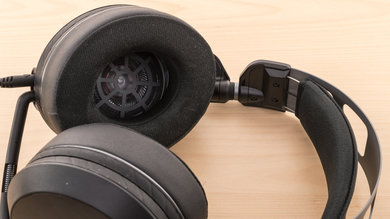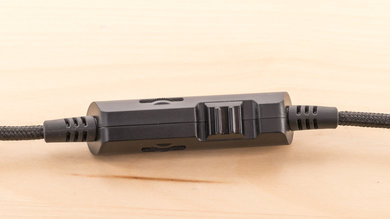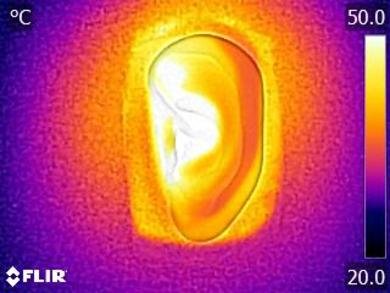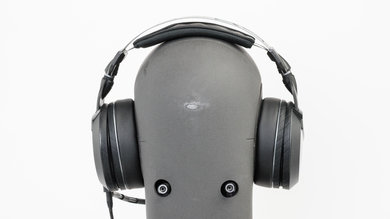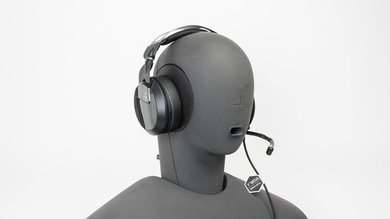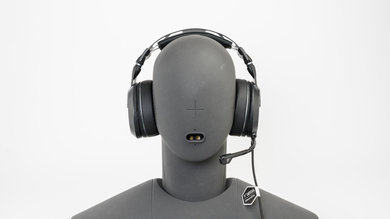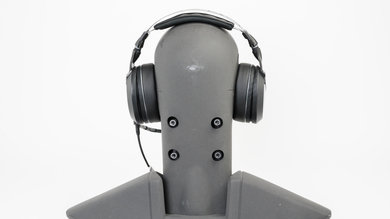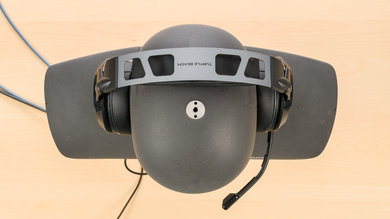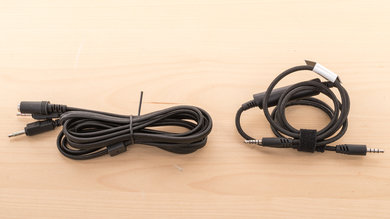The audio team will be at Montreal's Audiofest March 28-30! Come visit our booth in the Marketplace where we'll be measuring your headphones on our B&K rig!
The Turtle Beach Elite Atlas is a good wired gaming headset and is very similar to the Turtle Beach Elite Pro 2 SuperAmp, with slight differences in performance. They still have the same comfortable design with thick and comfortable padding for long gaming sessions and great build quality. They have good audio reproduction even critical listeners can appreciate, and their detachable boom microphone is great for online gaming and calls. Unfortunately, they aren’t compatible with the Turtle Beach Audio Hub app for customization options, and they don’t isolate much noise. On the upside, these are a more budget variant of the other Turtle Beach and perform similarly, so the SuperAmp may not be worth it for some.
Our Verdict
The Turtle Beach Elite Atlas are average for mixed usage. They have a good audio reproduction that critical listeners will appreciate, but their bulky design and poor breathability performance won’t be great for sports. They also don’t isolate much ambient noise, meaning you won’t block out noise in your commute or at the office. Their short cable isn't ideal for watching TV from your couch. Overall, they're a good wired gaming option but don't have the versatility of wireless technology.
-
Good audio reproduction.
-
Durable and comfortable design.
-
Great microphone.
-
Sub-par isolation and leakage performance.
-
Lack of features and customization options.
-
A bit too bulky for casual use.
Good for neutral listening. The Turtle Beach Elite Atlas have deep and powerful bass, an accurate and clear mid-range, and a great treble range. Unfortunately, their bass is a bit boomy, and mid-range may sound a bit thin on vocals and lead instruments. Their treble range might also lack a bit of detail and could be sharp on certain frequencies for some people. They don’t have an EQ to customize their sound, but you will be able to appreciate their comfortable design for hours. You can also get the compatible Elite Pro ear pads if you'd like more bass.
The Turtle Beach Elite Atlas are sub-par for commuting and traveling. They're very bulky, and they don’t isolate enough noise to be a good option for bus rides. They're very comfortable for long flights and rides, but you may need to take breaks to let your ears cool off.
The Turtle Beach Elite Atlas are sub-par for sports. They aren't designed to be used for sports due to their bulky design. While they're stable for light movement, they'll come off your head during physical activity. Their closed-back over-ear design also traps a lot of heat inside and around your ears, which isn't suitable for sports.
The Turtle Beach Elite Atlas are mediocre for the office. While you’ll be able to wear them comfortably for hours during your shift, they don’t isolate ambient chatter very well, and they're a bit leaky so you might bother surrounding colleagues. On the upside, you won’t have to worry about a battery dying in the middle of the day.
Being a wired pair of headphones, the Turtle Beach Elite Atlas aren't suitable for wireless gaming.
The Turtle Beach Elite Atlas are above-average for gaming. This headset is great if you don’t mind the short cable and the fact it isn’t wireless. You can still use the PC splitter cable for additional range. The microphone is very good for online gaming, and the sound quality is good. The thick padding is comfortable for long gaming sessions, but you might have to take the headset off from time to time to let your ears cool off as they do get hot after a while. Just be sure to use them in a quiet environment since they don’t isolate ambient noise very well.
- 6.3 Mixed Usage
- 7.7 Neutral Sound
- 5.8 Commute/Travel
- 6.0 Sports/Fitness
- 6.1 Office
- 5.9 Wireless Gaming
- 7.7 Wired Gaming
- 7.4 Phone Call
- Updated Nov 21, 2019: Converted to Test Bench 1.3.1.
- Updated Nov 21, 2019: Converted to Test Bench 1.3.
- Updated Jan 25, 2019: Review published.
- Updated Jan 23, 2019: Our testers have started testing this product.
- Updated Jan 21, 2019: The product has arrived in our lab, and our testers will start evaluating it soon.
- Updated Jan 16, 2019: We've purchased the product and are waiting for it to arrive in our lab.
Check Price
Compared To Other Headphones

The Turtle Beach Elite Atlas is a good wired gaming headset that'll satisfy most gamers due to its comfortable design, accurate audio reproduction, and great microphone for communicating with friends and teammates. Unfortunately, these headphones don't have a great isolation performance and lack customization features like other gaming headsets. The price point makes them a good pick for people who want a quality product at an affordable price. See our recommendations for the best gaming headsets, the best PS4 headsets, and the best gaming headsets under $100.
Technically, the Turtle Beach Elite Pro 2 SuperAmp is slightly better than the Turtle Beach Elite Atlas thanks to the amp and customization options. However, for the price difference, we suggest getting the Atlas since they are very similar headsets. The Atlas even has better more neutral default sound quality, although you can get the Elite Pro 2 pads for the Atlas if you want a bit more bass. Overall, unless you want to stream music from your phone with Bluetooth while gaming or you like the big volume wheel of the amp, the Atlas is the better choice. For most users, the amp won't be worth the huge difference in price, especially since you get a small volume wheel on the Atlas’ in-line remote.
The HyperX Cloud Alpha are better wired gaming headphones than the Turtle Beach Elite Atlas. While both are equally comfortable, the Alpha feel a bit more durable, thanks partly to their detachable audio cable. Both headphones have decently well-balanced sound profiles, though the Turtle Beach sound a bit more cluttered and muddy. If you play a lot of competitive online games, the Turtle Beach may be a better option, however, as their microphone performs a bit better overall, and your voice will sound much more natural and clear.
The Turtle Beach Elite Atlas is a slightly better headset than the HyperX Cloud 2/Cloud II if you care about sound quality the most. Both headsets are very comfortable, but the cups are deeper and larger on the Turtle Beach. However, the HyperX has channel mixing that gamers should appreciate to mix game and chat audio. The HyperX also slightly isolate more ambient noise and don't get as hot as the Turtle Beach.
If you really want a wireless headset for gaming, then the LucidSound LS31 Wireless is a better option than the Turtle Beach Elite Atlas. The LucidSound provides you with more freedom to move around or to game from your couch without a wire. It also has dials to mix game and chat audio, which is convenient. However, if wireless technology is not a must, the Turtle Beach are more comfortable, better-built, and has great audio reproduction.
Both the Razer Kraken Tournament Edition and Turtle Beach Elite Atlas are decent gaming headphones. The Atlas offers an overall more comfortable fit and parts like the ear cups padding are easily switchable and replaceable. Their audio quality is also more accurate than the Kraken, but it can’t be EQ’ed since they don’t have any companion app or software. On the other hand, the Kraken can also enable surround sound and have better controls than the Atlas.
Test Results
The Turtle Beach Elite Atlas are very similar to the Turtle Beach Elite Pro 2 SuperAmp. They have the same premium and high-end look. The headset has large ear cups and has a nice-looking metal headband. The ear cup backplates are magnetic and can be swapped out with different designs that can be bought separately. However, the default glossy black plates are fingerprint prone. The earpads are thick, and the microphone is malleable and detachable. These headphones were designed as gaming headphones, and their looks show it.
The Turtle Beach Elite Atlas is a very comfortable gaming headset that can be worn for long playing sessions. The ear cup cushioning is thick and soft, and the cups are wide and deep, so most ears shouldn't touch the drivers. The headband is also comfortable and well-padded. Unfortunately, there are only a few size adjustments possible, and the smallest setting might be too large for people with smaller heads. You could also feel gaps behind the ears because of the large cups. These headphones are also quite tight on the head. On the upside, the pads are also comfortable for people wearing glasses as they relieve pressure thanks to their ProSpecs glasses relief system.
The Turtle Beach Elite Atlas' in-line remote offers a limited amount of controls. You get a decent mic switch that shows a red strip when muted and a volume wheel. However, the switch feels a bit mushy, and the wheel doesn’t stick out much, so some might feel like it’s a bit hard to use and turn.
Like most over-ear headsets, the Turtle Beach Elite Atlas isn’t very breathable. You’re going to feel a temperature difference after long gaming sessions. These aren't designed for sports since you'll sweat more than usual while wearing them. The pads are thick, and the headset is fairly tight on the head, which doesn’t allow much airflow. Also, the leather material used isn’t as breathable as porous fabric pads like on the Logitech G433 or Astro A50 Gen 3 Wireless 2017. This shouldn’t be an issue if you take breaks between online games and take off the headset from time to time.
Like most gaming headphones, the Turtle Beach Elite Atlas have a bulky design and aren't meant to be portable. The headset doesn’t fold into a more compact format, but the hinges do rotate, so the cups lay flat, making it easier to slide in a bag.
The Turtle Beach Elite Atlas don't come with a case or a pouch.
The Turtle Beach Elite Atlas seem to be identical to the Turtle Beach Elite Pro 2 SuperAmp regarding build quality. The metal headband feels solid, and the cups are large and dense and should survive a few accidental drops. However, since the padding and backplates are magnetic, they might come off the headset if the impact is significant enough. The weakest point of the headset seems to be the size adjustment sliders as they're made of plastic. On the upside, the detachable microphone is malleable and feels well-made. All detachable parts on this headset are easy to replace as they're sold separately by Turtle Beach.
This headset isn't for physical activity and shouldn’t be used for running or at the gym. The bulky Turtle Beach Elite Atlas were designed for gaming purposes in a stationary position. The clamping force is tight, and you won’t feel them wiggling on your head while gaming. However, as soon as you start moving, they can easily come off your head. They're also wired headphones, so there’s a risk for the cable to get hooked on something, yanking the headset off your head. Thankfully, the cable is also detachable, so it might disconnect before pulling the headset.
The Turtle Beach Elite Atlas have a decent frequency response consistency. In the bass range, it shows more than 5dB of variance across our human subjects, which is average. On the upside, it's consistent in the treble range across multiple reseats under 10kHz.
The Turtle Beach Elite Atlas have great bass accuracy. Sub-bass (low-frequency extension) is extended down to 10Hz, which is excellent. This indicates that these headphones can produce a good amount of thump and punch. Mid-bass is flat and even, accurately adding punch to bass and kicks. The 4dB bump in high-bass makes the sound of these headphones boomy. Also, their bass delivery slightly varies across users, and is sensitive to the quality of the fit, seal, and whether you wear glasses. The response here represents the average bass response, and your experience may vary.
The Turtle Beach Elite Atlas have very good mid accuracy. The dip in low-mid makes vocals and lead instruments a tad thin, but will also create more room for the thump and rumble of the bass to come through. Mid-mid and high-mid are flat and even and within 1dB of our target, which is important for producing well-balanced and clear vocals and instruments.
The Turtle Beach Elite Atlas have great treble accuracy. The response up to 4-5kHz is flat and even, but there’s a dip around 5kHz which make these frequencies lack detail and brightness. Also, some people may feel that the peak around 9kHz makes S and T sounds sharp and piercing. However, not everyone will hear it as sibilant as others.
The Turtle Beach Elite Atlas' imaging performance is excellent. The weighted group delay falls below the audibility threshold, ensuring a tight bass and a transparent treble reproduction. Additionally, the L/R drivers of our test unit were very well-matched, which is important for the accurate placement and localization of objects (instruments, voice, footsteps), in the stereo image. However, these results are only valid for our unit and yours may perform differently.
The Turtle Beach Elite Atlas have a sub-par soundstage. The PRTF graph shows little amount of pinna interaction and poor accuracy of the activated resonances. There is also no notch present at 10kHz, meaning the soundstage will be perceived inside the listener's head. Also, the closed-back design means that these headphones won't be as open-sounding as open-back headphones.
The Turtle Beach Elite Atlas have poor noise isolation. These closed-back headphones don't have ANC (active noise canceling), and therefore don't provide any noticeable isolation in the bass range. This means they will let in all the rumble and low-frequency noises like the sound of airplane and bus engines. In the mid-range, important for blocking out speech, they achieve 7dB of isolation, which is mediocre. In the treble range, occupied by sharp sounds like S and Ts, and computer fans, they provide 25dB of isolation, which is above-average.
The leakage performance of the Turtle Beach Elite Atlas is sub-par. A significant portion of their leakage is between 300Hz and 5kHz, which is a broad range. The overall level of the leakage is also moderately loud. With the music at 100db SPL, the leakage at 1 foot away averages at 48dB SPL and peaks at 67dB SPL, which is noticeably louder than the noise floor of an average office.
The boom mic of the Turtle Beach Elite Atlas is great. In quiet environments, speech recorded or transmitted with this mic sounds full-bodied, relatively detailed, and intelligible. However, it will sound bass-heavy and thicker than the Turtle Beach Elite Pro 2 SuperAmp's mic. In noisy situations, it can separate speech from background noise to a great degree even in very demanding situations, like a gaming convention.
The boom microphone has a great recording quality. The LFE (low-frequency extension) of 20Hz results in a recorded/transmitted speech that sounds full-bodied. The microphone is bass-heavy, and speech will sound a bit thicker and muddier, which won’t be ideal for gaming. It may also be prone to pops and low-frequency noises. However, the HFE (high-frequency extension) of 9.4kHz results in a speech that's clear, intelligible, and detailed. This makes speech a little bit bright sounding, which is good for cutting through game audio and sound effects.
The microphone is great at noise handling. It achieved a speech-to-noise ratio of about 43dB SPL in our SpNR test, indicating it's capable of separating speech from ambient noise to a great degree in almost all environments, which means you’ll be able to use it in gaming conventions.
The Turtle Beach Elite Atlas are wired and don't have a battery.
The Turtle Beach Elite Atlas aren't compatible with the Turtle Beach Audio Hub software and app. If you want a gaming headset with customization options, we suggest the SteelSeries Arctis 7 Wireless 2017, the Logitech G933 Wireless, or the Razer Nari Ultimate.
The Turtle Beach Elite Atlas aren't Bluetooth-compatible.
This gaming headset doesn't have a base or dock. For a gaming headset with one, we suggest the SteelSeries Arctis 7 Wireless 2017 or the Astro A50 Gen 3 Wireless 2017.
Comments
Turtle Beach Elite Atlas: Main Discussion
Let us know why you want us to review the product here, or encourage others to vote for this product.


